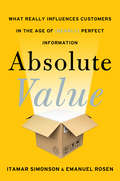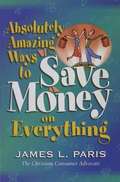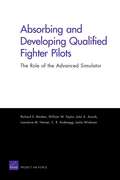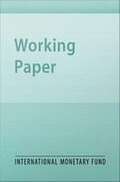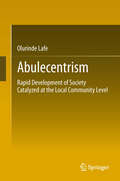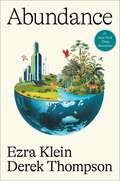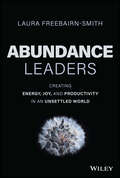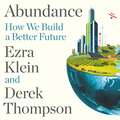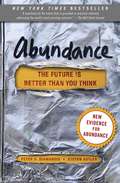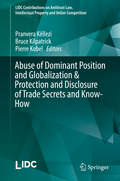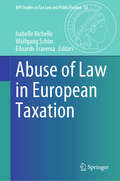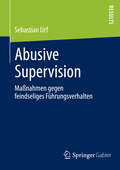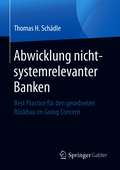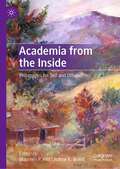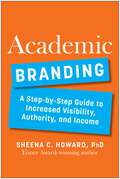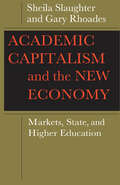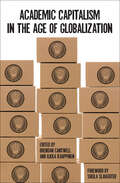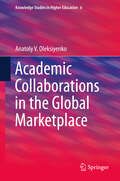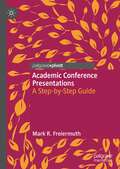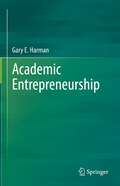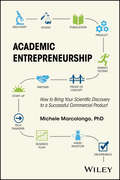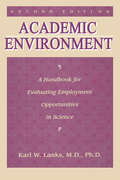- Table View
- List View
Absolute Value: What Really Influences Customers in the Age of (Nearly) Perfect Information
by Emanuel Rosen Itamar SimonsonGoing against conventional wisdom, Absolute Value reveals what really influences customers today and offers a new framework--the Influence Mix--for thinking about consumer decision making, which should help managers develop more effective marketing strategies.How people buy things has changed profoundly--yet the fundamental thinking about consumer decision making and marketing has not. Most marketers still believe that they can shape consumers' perceptions and drive their behaviors. In this provocative book, Stanford professor Itamar Simonson and best-selling author Emanuel Rosen show why current mantras about branding and loyalty are losing their relevance. When consumers base their decisions on reviews from other users, easily accessed expert opinions, price comparison apps, and other emerging technologies, everything changes. Contrary to what we frequently hear, consumers will (on average) make better choices and act more rationally.Absolute Value answers the pressing question of what influences customers in this new age. Simonson and Rosen identify the old-school marketing concepts that need to change and explain how a company should design its communication strategy, market research program, and segmentation strategy in the new environment. Filled with deep analysis, case studies, and cutting-edge research, this forward-looking book provides an entirely new way of thinking about marketing.
Absolutely Amazing Ways to Save Money on Everything
by James ParisTips on saving money on dining out, health care, home repair and much more.
Absorbing and Developing Qualified Fighter Pilots
by Lawrence M. Hanser Clarence R. Anderegg John A. Ausink William W. Taylor Richard S. MarkenWhat qualifications determine whether a fighter pilot is experienced? Surveys of expert pilots revealed that, while flying time is an element of the experience needed for both combat and staff jobs, other things are also important. The Air Force needs to measure and credit different types of experience-including time spent in advanced simulator systems-when revising its definitions of pilot experience.
Absorption Boom and Fiscal Stance: What Lies Ahead in Eastern Europe?
by Jesmin RahmanFinancial report from the IMF
Abu Issa Holding: Navigating the Qatar Blockade
by Mark Egan Youssef Abdel AalThe case follows Ashraf Abu Issa, CEO and chairman of Abu Issa Holding (AIH), as he contemplated the fate of his company's regional expansion. AIH was a Qatari diversified holding company, whose primary business was luxury retailing and distribution. Abu Issa had set his company on a path of aggressive regional expansion since 2012, rapidly opening new stores in neighboring countries, most notably Saudi Arabia and the UAE. In July 2017, he woke up to the news that Saudi Arabia along with the UAE, Bahrain, and Egypt had imposed a blockade on Qatar, cutting diplomatic relations with the country as well as closing all movements of people, goods and money between their countries and Qatar. A year into the blockade the situation was rapidly deteriorating, Abu Issa was at a crossroads: Should he wait for the blockade to end? Or was now the right time to exit and focus on the Qatari market at home? If he chose to exit, could he find a new investor to buy the business at a discount? Or should he close his shops and move as much as their inventory and staff as possible to Qatar? If he chose to exit, what would be the best way to do so?
Abulecentrism: Rapid Development of Society Catalyzed at the Local Community Level
by Olurinde LafeThe book describes a development concept called abulecentrism. The Yoruba word abule (pronounced: a-boo-lay) literarily means "the village". abulecentrism seeks to achieve rapid and sustainable development of a given society by the strategic execution of projects and the provision of critical services at the local community level. The village has always been the traditional unit of communal living in many societies around the world. The typical village is small, comprising close-knit social groups and individuals that number in the tens, or at most, low hundreds. In a village, people live close to one another, and derive strength in their communal methods of living, working and protecting their society. Furthermore, the management and governance of the community is simpler than in urban areas because the village requires smaller administrative systems. abulecentrism is built on the philosophy of using small, modular systems, such as a village, as building blocks for developing the greater society. The ultimate goal of abulecentrism is for the larger society to be significantly impacted by the dividends of the aggregated development attained within the different communities. Development projects will typically be executed by starting with a few local communities and progressing organically until all the communities that make up the larger society have been impacted.
Abundance
by Derek Thompson Ezra KleinFrom bestselling authors and journalistic titans Ezra Klein and Derek Thompson, Abundance is a once-in-a-generation, paradigm-shifting call to renew a politics of plenty, face up to the failures of liberal governance, and abandon the chosen scarcities that have deformed American life. <p> To trace the history of the twenty-first century so far is to trace a history of unaffordability and shortage. After years of refusing to build sufficient housing, America has a national housing crisis. After years of limiting immigration, we don’t have enough workers. Despite decades of being warned about the consequences of climate change, we haven’t built anything close to the clean-energy infrastructure we need. Ambitious public projects are finished late and over budget—if they are ever finished at all. The crisis that’s clicking into focus now has been building for decades—because we haven’t been building enough. <p> Abundance explains that our problems today are not the results of yesteryear’s villains. Rather, one generation’s solutions have become the next generation’s problems. Rules and regulations designed to solve the problems of the 1970s often prevent urban-density and green-energy projects that would help solve the problems of the 2020s. Laws meant to ensure that government considers the consequences of its actions have made it too difficult for government to act consequentially. In the last few decades, our capacity to see problems has sharpened while our ability to solve them has diminished. Progress requires facing up to the institutions in life that are not working as they need to. It means, for liberals, recognizing when the government is failing. It means, for conservatives, recognizing when the government is needed. <p> In a book exploring how we can move from a liberalism that not only protects and preserves but also builds, Klein and Thompson trace the political, economic, and cultural barriers to progress and propose a path toward a politics of abundance. At a time when movements of scarcity are gaining power in country after country, this is an answer that meets the challenges of the moment while grappling honestly with the fury so many rightfully feel. <b>New York Times Bestseller</b>
Abundance Leaders: Creating Energy, Joy, and Productivity in an Unsettled World
by Laura Freebairn-SmithTransform your ability to lead others with an abundance leadership mindset In Abundance Leaders: Creating Energy, Joy, and Productivity in an Unsettled World, renowned management consultant and lecturer Laura Freebairn-Smith delivers a rigorous and practical discussion of energetic, joyful, and productive leadership. In the book, you’ll learn what sets leaders with an “abundance mindset” apart from those with a “scarcity mindset,” and why the former creates work environments that generate superior performance when compared to those created by the latter. The author comprehensively explains the Abundance Leadership Model and convincingly demonstrates how it leads to immediate and tangible improvements in productivity and employee wellbeing. You’ll also find: A list of 26 distinct behaviors that signal a manager or executive is working in an abundance leadership mindset Strategies for leading bravely, making big, impactful promises, and aligning your organization around its purpose Ways to shape the culture at your organization in ways that drive dramatic improvements to the bottom line and worker satisfaction An essential resource for managers, executives, board members, and other business leaders, Abundance Leaders will also earn a place in the libraries of anyone with an interest in leadership or organizational culture.
Abundance: How We Build a Better Future
by Derek Thompson Ezra KleinA FINANCIAL TIMES TOP PICK OF 2025The real threat to liberal democracy isn't just from autocrats - but from a lack of effective action by so-called progressives.We have the means to build an equitable world without hunger, fuelled by clean energy. Instead, we have a politics driven by scarcity, lives defined by unaffordability and public institutions that no longer deliver on big ideas. It's time for change.Bestselling authors Ezra Klein and Derek Thompson have spent decades analysing the political, economic and cultural forces that have led us here. In this once in a generation intervention, they unpick the barriers to progress and show how we can, and must, shift the political agenda to one that not only protects and preserves, but also builds. From healthcare to housing, infrastructure to innovation thy lay out a path to a futuredefined not by fear, but by abundance.
Abundance: The Future Is Better Than You Think (Exponential Technology Series)
by Steven Kotler Peter H. DiamandisThe New York Times bestselling &“manifesto for the future that is grounded in practical solutions addressing the world&’s most pressing concerns: overpopulation, food, water, energy, education, health care and freedom&” (The Wall Street Journal).Since the dawn of humanity, a privileged few have lived in stark contrast to the hardscrabble majority. Conventional wisdom says this gap cannot be closed. But it is closing—and fast. In Abundance, space entrepreneur turned innovation pioneer Peter H. Diamandis and award-winning science writer Steven Kotler document how progress in artificial intelligence, robotics, digital manufacturing synthetic biology, and other exponentially growing technologies will enable us to make greater gains in the next two decades than we have in the previous 200 years. We will soon have the ability to meet and exceed the basic needs of every person on the planet. Abundance for all is within our grasp. Breaking down human needs by category—water, food, energy, healthcare, education, freedom—Diamandis and Kotler introduce us to innovators and industry captains making tremendous strides in each area. &“Not only is Abundance a riveting page-turner…but it&’s a book that gives us a future worth fighting for&” (The Christian Science Monitor).
Abuse of Dominant Position and Globalization & Protection and Disclosure of Trade Secrets and Know-How (LIDC Contributions on Antitrust Law, Intellectual Property and Unfair Competition)
by Bruce Kilpatrick Pierre Kobel Pranvera KëlleziThis publication provides an unparalleled comparative analysis of two "hot topics" in the field of antitrust and unfair competition law with regard to a number of key countries. The first part of the book examines the prohibition of abuse of a dominant position and globalization in relation to two broad questions: first, whether there is consistency between the approaches of different jurisdictions to the notion of abuse, and, second, whether there are too many restrictions on legal rights and business opportunities resulting from the prohibition of abuse of dominance. The international report drafted by Professor Pinar Akman reveals that there are as many similarities as differences between the approaches of the twenty-one jurisdictions studied and presented in this book. This is an invitation to read the excellent international report as well as the reports on specific jurisdictions in order to grasp the variety of arguments and approaches of this antitrust area, which may, on the surface, appear alike. The second part gathers contributions on the question of protection and disclosure of trade secrets and know-how from various jurisdictions. The need for adequate protection of trade secrets has increased due to digitalization and the ease with which large volumes of misappropriated information can be reproduced. The comprehensive international report, prepared by Henrik Bengtsson, brings together these reflections by comparing various national positions. The book also discusses the resolutions passed by the General Assembly of the International League of Competition Law (LIDC) following a debate on each of these topics, and includes proposed solutions and recommendations.
Abuse of Law in European Taxation (MPI Studies in Tax Law and Public Finance #12)
by Wolfgang Schön Isabelle Richelle Edoardo TraversaThis book explores the meaning and the impact of the concept of abuse of law in European taxation. Fighting abusive arrangements has gained prominence along three different dimensions: as a methodological tool to constrain access to tax benefits under EU law, as a ground of justification for disadvantageous treatment of cross-border activities and investment, and as a policy goal underlying recent EU tax legislation. The contributors to this book—leading academics and practitioners from different European countries—discuss the most burning issues concerning the prohibition of abuse in tax matters. Starting from a general clarification of notions like &‘tax avoidance&’ and &‘aggressive tax planning&’ and informed by a deep-diving comparative analysis of the concept of &‘abuse&’, the authors examine special anti-avoidance rules both in EU legislation on indirect taxes and under the existing EU corporate tax directives. Furthermore, the authors shed a critical light on the effect of European fundamental freedoms on national anti-abuse provisions. Last but not least the impact of the recently introduced Global Minimum Tax (GloBE) on the operation of anti-abuse rules receives scrutiny. In the end, the book tries to answer whether these different fields of application are informed by a unified notion of fiscal abuse. Given the world-wide momentum behind the fight against fiscal fraud and tax avoidance, the analytical approach of this book, bringing together different strands of legislature and jurisprudence, will be of substantial value for the work of both practitioners and scholars in the field of EU taxation.
Abusive Supervision: Maßnahmen gegen feindseliges Führungsverhalten
by Sebastian UrfBeschimpfungen, untergrabende Aktionen, kränkende Bemerkungen, ärgerliches Anschreien und das Bloßstellen vor Mitarbeitern, Chefsoder sogar Kunden sind Aktionen, die einer Führungskraft nicht würdig sind. Und doch sind zumindest im US-amerikanischen Raum 10 bis 16% der Angestellten davon betroffen. Dadurch entsteht ein gesamtwirtschaftlicher Schaden von 23. 800. 000,-- Dollar allein in den USA. Sebastian Urf untersucht dieses feindselige Führungsverhalten (engl. ,,Abusive Supervision") und stellt die derzeit weltweit erfassten Erkenntnisse über Ursachen und Wirkungen vor. Im Anschlussdaran zeigt er mögliche Gegenmaßnahmen, die von derUnternehmensleitung, der unterstellten Zielperson und der feindseligen Führungskraft zur Besserung durchgeführt werden können.
Abwechslungsweise miteinander: Über den Trugschluss zu meinen, die anderen seien schuld
by Jürg IsenschmidJeder von uns ist Teil eines sozialen Netzwerks oder einer Hierarchie. Im Kreise der Familie sind wir es als Eltern oder Jugendliche, beruflich als Vorgesetzte oder Mitarbeitende. Im Alltag sind wir hierbei immer wieder mit Situationen konfrontiert, die zu Störungen oder Disharmonie führen. Natürlich können wir es uns einfach machen und meinen, die anderen seien schuld. Doch trifft dies tatsächlich zu? Jürg Isenschmid versteht es, unser Verhalten in sozialen Gefügen anschaulich zu analysieren und uns erkennen zu lassen, dass jeder dazu beitragen kann, ein friedliches Miteinander zu gestalten – auch Sie!
Abwicklung nicht-systemrelevanter Banken: Best Practice für den geordneten Rückbau im Going Concern
by Thomas H. SchädleDieses Buch liefert den Verantwortlichen in Banken und Sparkassen wichtige Hilfestellung bei der zielgerichteten Bewältigung von Krisensituationen. Am Ende des Prozesses können sowohl eine geordnete Insolvenz, eine Fusion oder Übernahme wie auch eine möglichst wertschonende Abwicklung bei Fortführung der Geschäftstätigkeit (Going Concern) mit anschließender Liquidation stehen. Thomas Schädle liefert dazu neben den rechtlichen Grundlagen in praxisnaher Form Konzepte für die geeignete Auswahl erfolgskritischer Mitarbeiter, eine effektive Kommunikation mit Mitarbeitern und anderen Stakeholdern, insbesondere auch für die Abstimmung mit den Aufsichtsbehörden. Im Rahmen der konkreten Planung, Steuerung und Umsetzung der Abwicklung erläutert er die Vorgehensweise und kritischen Milestones im Rahmen des Rückbaus sämtlicher Bilanzpositionen sowie außerbilanzieller Positionen, veranschaulicht die detaillierte Inventarisierung, die Initiierung eines Ressourcenmanagements sowie den konkreten Abwicklungsprozess bis hin zum Auflösungsbeschluss des Kreditinstituts.
Academia Barilla
by David E. BellBarilla, the world's largest pasta company, has introduced a new high-quality, high-priced product line that features a range of authentic Italian food products sourced from artisan producers. Management believes the line will appeal to consumers seeking healthier foods and convenience, and will help extend Barilla's brand identification beyond pasta. However, the new line is a bold departure from Barilla's core competencies of high-volume production and sales of fast moving, low-priced goods. Provides an opportunity to discuss trends in consumer eating habits, supply chains for locally-produced goods, and changes in retail formats. In addition, provides an opportunity to discuss the difference in investment philosophy between a family-owned company and a publicly-traded company.
Academia from the Inside: Pedagogies for Self and Other
by Maureen P. Hall Aubrie K. BraultThis book invites readers to explore how fourteen different experts in their respective fields create deeper meaning in their profession and work with students through thinking, in multiple ways, about the self who teaches, the self who learns, and the ways in which these selves interact within the academy. Essays in this book explore the “inside” of academia through three themes: Pursuing Authenticity, Creating Creative Community, and Humanizing Education. Contributors reflect on their own lived experiences in the academy and on pedagogies that they have created for their students. Embodied education, the theoretical framework of this book, draws on ideas of educators Parker Palmer from the West and Dr. Chinmay Pandya from the East, emerging through contributors’ collaborative work. In embodied education, teachers and learners share experiences that lead to self-understanding and together find ways to humanize spaces in academia.
Academic Branding: A Step-by-Step Guide to Increased Visibility, Authority, and Income
by Sheena HowardBecome a thought leader in your postgraduate field—and make money while doing so, with this step-by-step guide from an academic who has been there. Academic Branding gives academics and scholars the tools and strategies they need to position themselves outside of academia so they can reach the masses and make an impact—without the expense of a publicist. With the practices in this book, readers will build a powerful brand, become a public intellectual, and grow their audience with guidance from Sheena C. Howard, PhD. She&’s been where you are now, and she&’s ready to help you grow beyond what you imagine. With Dr. Howard&’s unique and thorough approach to success in the age of social media, you&’ll learn how to: Reframe the way you think about self-promotion Identify your brand archetype and create a brand statement Reach an audience beyond academia Build multiple revenue streams Get your ideas (and content) to spread Create a movement around your expertise Land major media spots and speaking engagements In a world where anyone who is savvy online can turn themselves into a subject matter expert, it&’s important that we lift up and amplify the voices of actual subject matter experts. This guide will teach you how to reach the audience that needs your expertise most, building a brand and achieving financial freedom along the way.
Academic Capitalism and the New Economy: Markets, State, and Higher Education
by Sheila Slaughter Gary RhoadesAs colleges and universities become more entrepreneurial in a post-industrial economy, they focus on knowledge less as a public good than as a commodity to be capitalized on in profit-oriented activities. In Academic Capitalism and the New Economy, higher education scholars Sheila Slaughter and Gary Rhoades detail the aggressive engagement of U.S. higher education institutions in the knowledge-based economy and analyze the efforts of colleges and universities to develop, market, and sell research products, educational services, and consumer goods in the private marketplace. Slaughter and Rhoades track changes in policy and practice, revealing new social networks and circuits of knowledge creation and dissemination, as well as new organizational structures and expanded managerial capacity to link higher education institutions and markets. They depict an ascendant academic capitalist knowledge/learning regime expressed in faculty work, departmental activity, and administrative behavior. Clarifying the regime's internal contradictions, they note the public subsidies embedded in new revenue streams and the shift in emphasis from serving student customers to leveraging resources from them.Defining the terms of academic capitalism in the new economy, this groundbreaking study offers essential insights into the trajectory of American higher education.
Academic Capitalism in the Age of Globalization
by Brendan Cantwell and Ilkka KauppinenUnderstanding higher education and the knowledge economy in the Age of Globalization.Today, nearly every aspect of higher education—including student recruitment, classroom instruction, faculty research, administrative governance, and the control of intellectual property—is embedded in a political economy with links to the market and the state. Academic capitalism offers a powerful framework for understanding this relationship. Essentially, it allows us to understand higher education’s shift from creating scholarship and learning as a public good to generating knowledge as a commodity to be monetized in market activities. In Academic Capitalism in the Age of Globalization, Brendan Cantwell and Ilkka Kauppinen assemble an international team of leading scholars to explore the profound ways in which globalization and the knowledge economy have transformed higher education around the world. The book offers an in-depth assessment of the theoretical foundations of academic capitalism, as well as new empirical insights into how the process of academic capitalism has played out. Chapters address academic capitalism from historical, transnational, national, and local perspectives. Each contributor offers fascinating insights into both new conceptual interpretations of and practical institutional and national responses to academic capitalism.Incorporating years of research by influential theorists and building on the work of Sheila Slaughter, Larry Leslie, and Gary Rhoades, Academic Capitalism in the Age of Globalization provides a provocative update for understanding academic capitalism. The book will appeal to anyone trying to make sense of contemporary higher education.
Academic Collaborations in the Global Marketplace (Knowledge Studies in Higher Education #6)
by Anatoly V. OleksiyenkoThis book explains why conflict between the institutional and human agencies is an unavoidable outcome of competing local, national and global agendas at a major research university. It illustrates this by means of a case-study of Glonacal U, a university which belongs to the category of exceptional institutions that excel due to an established organizational culture of academic freedom, research excellence, shared governance, and intellectual leadership. The book shows how such a university may succumb to anxiety when neoliberal managers seek to exploit stakeholder doubts about university sufficiency, relevance, and performance in national and global markets and hierarchies of knowledge products and status goods. As top-down pressure for strategic choices in scientific partnerships increases at the world-class university, grassroots resistance to centralization increases also in order to remind the research university leaders that intellectual work and academic freedom are interdependent and central to building capacities for impactful global science. Productive global linkages are prerogative of academics who take full responsibility for success of project implementation and outcomes in scholarship and practice.
Academic Conference Presentations: A Step-by-Step Guide
by Mark R. FreiermuthThis book provides a step-by-step journey to giving a successful academic conference presentation, taking readers through all of the potential steps along the way—from the initial idea and the abstract submission all the way up to the presentation itself. Drawing on the author's own experiences, the book highlights good and bad practices while explaining each introduced feature in a very accessible style. It provides tips on a wide range of issues such as writing up an abstract, choosing the right conference, negotiating group presentations, giving a poster presentation, what to include in a good presentation, conference proceedings and presenting at virtual or hybrid events. This book will be of particular interest to graduate students, early-career researchers and non-native speakers of English, as well as students and scholars who are interested in English for Academic Purposes, Applied Linguistics, Communication Studies and generally speaking, most of the Social Sciences. With that said, because of the book’s theme, many of the principles included within will appeal to broad spectrum of academic disciplines.
Academic Entrepreneurship
by Gary E. HarmanThis book explores different aspects of entrepreneurship from both an academic and a commercial point of view. The first chapter the university culture is considered. The nature of the technology or service is important. Some technologies are adaptive, in that they are developing products that are already in the marketplace, and these fit easily in academic institutions. Other technologies are disruptive and new products must be developed. These fit less easily into university structures since a commercial entity is required. Chapter 4 considers the important requirements of conflict of interest (COI). Either the university culture or COI can hinder or aid entrepreneurial faculty. The second chapter deals with the reasons why an individual faculty might wish to become entrepreneurial. In many cases, a faculty member wants to see their technology in practice and not just a publication in a scientific journal. If a technology is disruptive, then a commercial entity is probably essential. If so, then funding must be obtained. There are “valleys of death” (1) where scientific discoveries to useful products and (2) the development, production and marketing of a commercially viable product. Chapter 6 deals specifically with methods of funding start-up companies. Chapter 3 describes several innovative programs in biology. These include genetic approaches, plant management systems and the author’s own program that deals with microbial approaches to sustainable agriculture. Chapter 5 describes the crucial areas of agreements, contracts, regulatory affairs and patents. These legal documents are critical components of entrepreneurial efforts and must be understood and pursued correctly. Finally, this book could have been entitled “things I wish I had known when I first started commercial activities.” It is my hope that it can make the path of fledgling entrepreneurial smoother and more successful.
Academic Entrepreneurship: How to Bring Your Scientific Discovery to a Successful Commercial Product
by Michele MarcolongoThe pathway to bringing laboratory discoveries to market is poorly understood and generally new to many academics. This book serves as an easy-to-read roadmap for translating technology to a product launch – guiding university faculty and graduate students on launching a start-up company.• Addresses a growing trend of academic faculty commercializing their discoveries, especially those supported by the National Science Foundation and National Institutes of Health• Offers faculty a pathway and easy-to-follow steps towards determining whether their discovery / idea / technology is viable from a business perspective, as well as how to execute the necessary steps to create and launch a start-up company• Has a light-hearted and accessible style of a step-by-step guide to help graduate students, post-docs, and faculty learn how to go about spinning out their research from the lab• Includes interviews by faculty in the disciplines of materials science, pharmaceuticals, medical devices, information technology, energy, and mechanical devices – offering tips and discussing potential pitfalls to be avoided
Academic Environment: A Handbook For Evaluating Employment Opportunities In Science
by Karl W. LanksThis handbook deals with contracts, evaluating job offers, lawsuits, and deciding when to leave an institution. It provides an objective system that can be used to evaluate the atmosphere and working conditions in any academic or industrial environment.
